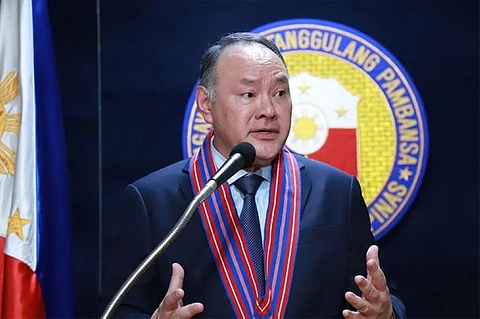
- NEWS
- the EDIT
- COMMENTARY
- BUSINESS
- LIFE
- SHOW
- ACTION
- GLOBAL GOALS
- SNAPS
- DYARYO TIRADA
- MORE

The Department of National Defense is reviewing which projects should be prioritized under the Armed Forces of the Philippines' modernization program, which has now covered three different administrations.
Defense Secretary Gilberto Teodoro Jr. on Tuesday said the review is at a critical point because if it takes too long, the prices of equipment and platforms being sought by the AFP may go up.
"We have to build up our capabilities as soon as possible, so this cannot be delayed," Teodoro said. "We are working day and night to establish our own systems and whatever capabilities that we can get from our treaty partners and allies."
He said the AFP wants its assets to achieve interoperability, making them more effective for the tasks at hand. He said the review may be completed by the end of the year.
Teodoro earlier ordered the AFP and his staff to start "re-horizoning" and the
"re-strategization" of the AFP modernization program, clearly referring to the long-term Horizons Modernization Program.
Horizon 1, covering 2013 to 2017 during the late Benigno Aquino III's presidency, focused on acquiring essential equipment and weapons systems to improve the AFP's minimum credible defense posture.
Some of the key projects completed during this phase included the acquisition of new frigates, fighter jets and armored vehicles.
Horizon 2, from 2018 to 2022, during the Duterte administration, acquired more advanced equipment and weapons systems like helicopters and air defense systems to enhance the AFP's deterrence and response capabilities.
Set for 2023 to 2028, Horizon 3 focused on acquiring
next-generation equipment and weapons systems to ensure the capability of the AFP to defend the country against external aggression.
With Teodoro's "re-horizoning" statement, the Marcos government is being seen as detaching from the original Horizons plan that was partly implemented by both the Aquino and Duterte administrations.
Teodoro said he wants the AFP to secure weapons systems and platforms capable of meeting all kinds of security threats.
He conceded that acquiring the systems could be expensive, but they will at least be "synergistic" and capable of handling security challenges.
"The Philippines is a potential vital contributor to the regional stability and security if we are a strong nation, with strong armed forces, and that is what we are working very hard to achieve," he said.
AFP chief General Romeo Brawner Jr. said the military is now working on a more strategic approach to meet security threats.
